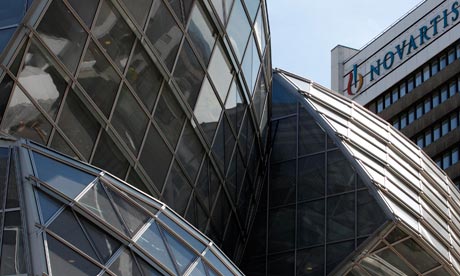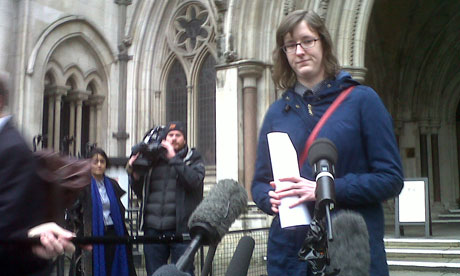The free market is a myth. From drug patents to quantitative easing, businesses make money because of state help

Swiss drugmaker Novartis's headquarters in Basel. ‘Switzerland infamously had no patent law until 1888, half a century after its introduction in most of rich capitalist countries.’ Photograph: Christian Hartmann/Reuters
Earlier this week, India's supreme court ruled that the country will not grant a patent to Novartis, the Swiss pharmaceutical company, for the cancer drug, Glivec. Being a new version of an existing drug, the ruling said, it does not deliver enough innovation to warrant a patent. Novartis condemned the ruling as "a setback for patients that will hinder medical progress for diseases without effective treatment options".
This statement is rich coming from a company from Switzerland – a country that infamously had no patent law until 1888, half a century after its introduction in most rich capitalist countries.
Even after 1888, Switzerland refused to award pharmaceutical and other chemical patents for two decades, the new patent law having stipulated that patents are granted only to "inventions that can be represented by mechanical models". The country introduced chemical patents only in 1907 under intense pressure from Germany, whose technologies its pharmaceutical companies were liberally "borrowing". Ciba-Geigy and Sandoz, whose merger in 1996 created Novartis, were among those companies.
What is more, until 1978, Switzerland granted patents only for chemical process (that is, how you make a chemical) and not for chemical substance (that is, the chemical itself), on the reasonable ground that the substance had always existed in nature and the "inventor" has only found a way of isolating it. This was actually a rather widely accepted view at the time. Germany and France had only just introduced chemical substance patents in the late 1960s. Canada and Spain refused to grant patents to pharmaceutical substances until 1992.
Despite all this history, the pharmaceutical industry is extremely aggressive with substance patents, as in the case of Glivec, because it knows that its profit level will fall dramatically without them. Unlike a BMW or an Airbus, chemical substances are very easy to copy. Even if the processes of manufacturing them are patented, you can relatively easily come up with alternative processes. Without the artificial monopoly conferred by the patent, the inventor of a chemical substance can make only little money (generic drugs typically cost 5% of drugs with patent monopoly).
Patent monopoly creates a lot of problems. It allows the patentee to charge the maximum to consumers. This may not be a problem if the patented product is a luxury item, like parts that go into a smartphone, but can violate basic human rights if it involves things such as life-saving drugs. Patent monopoly also blocks technological progress in the relevant fields during its duration (20 years), as other people cannot use the patented technologies in developing other technologies.
Despite all these problems, we, as society, grant patent monopoly because we believe that it brings more than compensating benefits. By giving greater incentives to invest in developing new technologies, patent monopoly can create more innovative technologies. This means that society has the right not to grant a patent for a technology when it feels that the benefits are outweighed by the costs, as in the Indian court ruling against Novartis.
The pharmaceutical industry most starkly reveals how profits are "social" creations – it makes its profit because it is granted artificial monopolies in the form of patents. But it is not alone in this respect.
Another obvious case is the banking industry. Today, many banks all over the world would not have existed but for the huge public money poured into them in the aftermath of the 2008 crisis. Even in the case of those that have not been bailed out, their profits would have been much lower (or their losses far bigger, in the case of loss-making ones) without the cheap money showered on them – without any condition, unlike in the case of state supports such as unemployment benefit – through cuts in interest rates and thequantitative easing by the Bank of England.
In other instances, the social protection of business is more roundabout. The horsemeat scandal has revealed that British supermarkets and the European meat industry have made higher profits from the relaxation of regulations regarding food standards, introduced by the coalition government in 2010 in the name of cutting government spending and, more important, "red tape". The Poundland scandal has revealed that British retail stores would make lower profits if they were not allowed to use the claimants of unemployment benefits as unpaid workers.
I can go on, but the point is that all businesses make what profits they make only because the government, and the electorate as the ultimate sovereign (at least in theory), helps them in all sorts of ways – free money (banks), free workers (Poundland), monopoly rights (pharmaceutical companies), implicit permission for substandard products (supermarkets).
Once we accept that the amounts of profit companies make are ultimately determined by these "welfare payments" society decides to confer upon them, we begin to see the problem with the free-market view that has dominated the world for the last few decades.
For far too long we have been told by the business lobby and free-market ideologues that profit is the objective indicator of a company's contribution to the economy, when it is really socially and politically determined. Poor people receiving government benefits have been told far too often that they are spongers, when the rich get even more government benefits.
It is time that we dispensed with the myth that the market is a force of nature that should not be meddled with. Markets are social creations that can be, and have been, modified for social purposes.
---------
West should learn from India’s high patent standards
SA Aiyar07 April 2013, 06:03 AM IST
The Supreme Court’s denial of a patent for Glivec, an anti-leukaemia drug made by Novartis of Switzerland, has been widely but wrongly hailed by NGOs and castigated by pharmaceutical companies as an attack on patents and a victory for cheap medicine. Actually, the Court fully upheld the principle of patents, but set a high bar for deciding what’s innovative and what’s mere tweaking.
Instead of attacking the verdict, Western countries should raise their standards too. Their overliberal grant of patents has led to the tiniest design changes becoming patentable. This was exemplified by last year’s ridiculous battle between Samsung and Apple on whether features like a rounded rectangular cellphone screen and finger movements were patentable. Smartphones are a great invention, but hardly justify the grant of as many as 25,000 patents, many for piffling details.
Till 1995, India refused to patent drug molecules. But as a consequence of WTO membership, India in 2005 allowed product patents for drugs, but only for innovations after 1995. This meant no patent for Glivec, which was patented first in 1993. To get around this, in 2006 Novartis tried to patent a new variation of Glivec, for which it claimed improved efficacy. Some other countries granted patents for this variation. But the Indian Patents Office rejected the claim as insufficiently innovative. So too has the Supreme Court.
Many NGOs hailed the judgment for the wrong reason. The Cancer Patients Aid Association, which led the fight against Glivec, declared: “We are happy that the apex court has recognised the right of patients to access affordable medicines over profits for big pharmaceutical companies through patents.”
False: no such right was recognized by the court. It simply said Novartis had not proved that the new variation was innovative enough. The court clarified that it would grant patents for variations that were more efficacious, but set a higher standard for proof than many western courts do.
NGOs are wrong to paint Novartis as a bloodsucker that pauperizes patients. Glivec has saved lakhs of leukaemia patients from death. This is a great boon, and we must encourage more such life-saving boons by granting patents for new drugs. However, this does not mean giving patents for mere tweaking and “evergreening” of existing drugs through minor variations.
Normally, governments promote competition and prohibit monopolies. But temporary monopolies (patents) are justified to promote innovation in drugs and other fields. The patent regime should ensure that the public benefit from innovation far exceeds the cost imposed by monopoly profits. This implies a high bar for granting patents. But the US and other western countries have been giving patents so liberally and broadly that these lead more to lawsuits than innovation, leaving lawyers as the chief beneficiaries . Patents are supposed to spur innovation, but when granted over-liberally they create so much lawsuit risk and cost that they end up hampering innovation, not aiding it.
The Economist (UK), no basher of multinationals, acknowledges that over-liberal “proliferation of patents harms the public in three ways. First, it means that technology companies will compete more at the courtroom than in the marketplace. Second, it hampers follow-on improvements by firms that implement an existing technology but build upon it as well. Third, it fuels many of the American patent system’s broader problems, such as patent trolls (speculative lawsuits by patentholders who have no intention of actually making anything); defensive patenting (acquiring patents mainly to pre-empt the risk of litigation, which raises business costs); and “innovation gridlock” (the difficulty of combining multiple technologies to create a single new product because too many small patents are spread among too many players).”
Patent trolls buy up patents in bulk, typically from bankrupt companies, not for actual use but simply to hit other innovators with lawsuits for patent infringement, forcing them to settle to avoid fat legal bills. One US study estimated such legal costs at $ 29 billion in 2011 alone.
Last year, Google bought Motorola’s failing smartphone business for $ 12.5 billion, to access its 17,000 patents. Microsoft and others paid $ 4.5 billion for 6,000 patents from Nortel. Most of these will never be used in actual production: they are simply kept as legal weapons for possible lawsuits. This has nothing to do with innovation, which patents are supposed to promote.
The West’s over-liberal patent system is broken. It should learn from India’s much tougher system. Patents should be seen as monopolies, to be given sparingly only for genuine innovations where the public benefit clearly exceeds the monopoly cost. This means setting a high bar for innovation. High standards are desirable for patents, as for everything else.
Instead of attacking the verdict, Western countries should raise their standards too. Their overliberal grant of patents has led to the tiniest design changes becoming patentable. This was exemplified by last year’s ridiculous battle between Samsung and Apple on whether features like a rounded rectangular cellphone screen and finger movements were patentable. Smartphones are a great invention, but hardly justify the grant of as many as 25,000 patents, many for piffling details.
Till 1995, India refused to patent drug molecules. But as a consequence of WTO membership, India in 2005 allowed product patents for drugs, but only for innovations after 1995. This meant no patent for Glivec, which was patented first in 1993. To get around this, in 2006 Novartis tried to patent a new variation of Glivec, for which it claimed improved efficacy. Some other countries granted patents for this variation. But the Indian Patents Office rejected the claim as insufficiently innovative. So too has the Supreme Court.
Many NGOs hailed the judgment for the wrong reason. The Cancer Patients Aid Association, which led the fight against Glivec, declared: “We are happy that the apex court has recognised the right of patients to access affordable medicines over profits for big pharmaceutical companies through patents.”
False: no such right was recognized by the court. It simply said Novartis had not proved that the new variation was innovative enough. The court clarified that it would grant patents for variations that were more efficacious, but set a higher standard for proof than many western courts do.
NGOs are wrong to paint Novartis as a bloodsucker that pauperizes patients. Glivec has saved lakhs of leukaemia patients from death. This is a great boon, and we must encourage more such life-saving boons by granting patents for new drugs. However, this does not mean giving patents for mere tweaking and “evergreening” of existing drugs through minor variations.
Normally, governments promote competition and prohibit monopolies. But temporary monopolies (patents) are justified to promote innovation in drugs and other fields. The patent regime should ensure that the public benefit from innovation far exceeds the cost imposed by monopoly profits. This implies a high bar for granting patents. But the US and other western countries have been giving patents so liberally and broadly that these lead more to lawsuits than innovation, leaving lawyers as the chief beneficiaries . Patents are supposed to spur innovation, but when granted over-liberally they create so much lawsuit risk and cost that they end up hampering innovation, not aiding it.
The Economist (UK), no basher of multinationals, acknowledges that over-liberal “proliferation of patents harms the public in three ways. First, it means that technology companies will compete more at the courtroom than in the marketplace. Second, it hampers follow-on improvements by firms that implement an existing technology but build upon it as well. Third, it fuels many of the American patent system’s broader problems, such as patent trolls (speculative lawsuits by patentholders who have no intention of actually making anything); defensive patenting (acquiring patents mainly to pre-empt the risk of litigation, which raises business costs); and “innovation gridlock” (the difficulty of combining multiple technologies to create a single new product because too many small patents are spread among too many players).”
Patent trolls buy up patents in bulk, typically from bankrupt companies, not for actual use but simply to hit other innovators with lawsuits for patent infringement, forcing them to settle to avoid fat legal bills. One US study estimated such legal costs at $ 29 billion in 2011 alone.
Last year, Google bought Motorola’s failing smartphone business for $ 12.5 billion, to access its 17,000 patents. Microsoft and others paid $ 4.5 billion for 6,000 patents from Nortel. Most of these will never be used in actual production: they are simply kept as legal weapons for possible lawsuits. This has nothing to do with innovation, which patents are supposed to promote.
The West’s over-liberal patent system is broken. It should learn from India’s much tougher system. Patents should be seen as monopolies, to be given sparingly only for genuine innovations where the public benefit clearly exceeds the monopoly cost. This means setting a high bar for innovation. High standards are desirable for patents, as for everything else.


